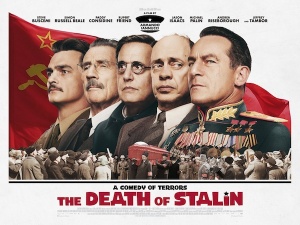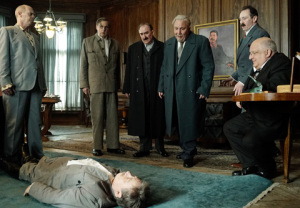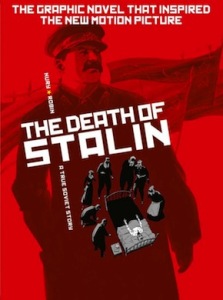Laughter in the dark
by Tom Browne
“Iannucci and his writing team have run off with history and made a delicious mockery of it.” Daily Telegraph
One of the memories I most treasure about In the Loop, writer-director Armando Iannucci’s previous big-screen outing, is the moment when Alastair Campbell sat down to view the film with critic Mark Kermode. As Tony Blair’s ex-spin-doctor, Campbell was understandably tetchy at being compared to onscreen fixer Malcolm Tucker, a profane and conniving bully. “I don’t find that particularly funny,” he mutters, as Tucker is shown spinning the government into a destructive Middle Eastern war (entirely fictional, of course).
Rewatching this after seeing Iannucci’s brilliantly realised follow-up The Death of Stalin, I imagined a similar chat taking place between Kermode and Stalin’s notorious henchman Lavrentiy Beria as the film unspools. (“I didn’t actually order his execution, Mark. He, on the other hand, had it coming.”) Moving from the shadowy world of modern-day Whitehall to the blacker world of Soviet Russia represents a significant upping of the stakes.
The year is 1953. Stalin (Adrian McLoughlin) reigns supreme in the Soviet Union, having consolidated his position over 25 years in power, defeated the Nazis and crushed all significant opposition at home. The members of his politburo, meanwhile – including Malenkov (Jeffrey Tambor), Khrushchev (Steve Buscemi), Molotov (Michael Palin) and Beria (Simon Russell Beale) – are a motley collection of corrupt and venal survivors, largely cowed by Stalin’s overbearing presence and capacity for retribution. Even the late-night boozing and joking has an undercurrent of violence, with the knife always lurking in the background (an unguarded Trotsky reference, for instance, swiftly proves a mistake).
It’s Fawlty Towers meets Solzhenitsyn, both in its exquisitely realised farce and in the knowledge that seemingly little things during this period had deadly consequences.”
The opening scene demonstrates how far this intimidation seeps beyond the walls of the Kremlin: musical director Andrey Andreyev (a splendid Paddy Considine) is sent into a panic when Stalin telephones to demand a non-existent recording of a live Tchaikovsky concerto. Cue a flustered attempt to restage the concert and pull in new audience members from the street, just so it can be recorded for the Big Man’s pleasure. Much like the rest of the film, it’s a moment best described as Fawlty Towers meets Solzhenitsyn, both in its exquisitely realised farce (for best results, put contents under pressure and observe) and in the knowledge that seemingly little things during this period had deadly consequences (The Gulag Archipelago famously tells of a standing ovation for one of Stalin’s speeches that went on and on because no one dared stop clapping).
 As the title indicates, however, this is a study of Stalinist terror mainly in respect of how it comes to overwhelm its chief architect. When Stalin suffers a stroke in his study – the one that ended up killing him – his guards remain outside since they have no orders to enter. (“Should we investigate?” says one. “Should you shut the fuck up before you get us both killed?” replies the other.) When he’s finally discovered, half dead in a puddle of urine, his underlings stand around helpless, terrified of acting without Stalin’s personal instructions and wary of summoning medical assistance, since their leader hates doctors and has already started purging them.
As the title indicates, however, this is a study of Stalinist terror mainly in respect of how it comes to overwhelm its chief architect. When Stalin suffers a stroke in his study – the one that ended up killing him – his guards remain outside since they have no orders to enter. (“Should we investigate?” says one. “Should you shut the fuck up before you get us both killed?” replies the other.) When he’s finally discovered, half dead in a puddle of urine, his underlings stand around helpless, terrified of acting without Stalin’s personal instructions and wary of summoning medical assistance, since their leader hates doctors and has already started purging them.
It’s easy to see why this material appealed to Iannucci. The Thick Of It, Veep and In The Loop all shared a fascination with the distorting effects of power, and this adaption of Fabien Nury and Thierry Robin’s graphic novel rinses every drop of black comedy from a bunch of goons so used to double-dealing and back-stabbing that it extends to every area of their lives. Dispensing with reality, the performers adopt a range of often-inspired accents to differentiate their characters: Steve Buscemi plays Khrushchev as a trash-talking New Yorker; Adrian McLoughlin’s Stalin seems to be channelling Ronnie Biggs; and Jason Isaacs renders Marshall Zhukov as the kind of no-nonsense Yorkshireman who revels in confrontation – a kind of Geoffrey Boycott in uniform.
Best of all, though, is Simon Russell Beale as Beria, whose matter-of-fact ruthlessness – “Kill him, dump him in the pulpit, I’ll leave the rest to you” – recalls Hannah Arendt’s phrase “the banality of evil” when describing Adolf Eichmann. Indeed, Beria’s pose as some kind of liberal reformer post-Stalin appears even more ridiculous in this rendering; if anyone demonstrated his leader’s famous maxim that one death is a tragedy but a million deaths is a statistic, it was Beria. It’s a testament to Beale’s timing and Iannucci’s direction that we can laugh at him at all, even though the occasional joke sticks in the throat.
Indeed, the fact that The Death of Stalin is possibly the funniest film I’ve seen all year is the most puzzling thing about it. The screening I attended was a riot of laughter from start to finish – somehow we accept a farcical rendering of Stalin’s most gruesome lieutenants, even though it’s hard to imagine the same trick working with Hitler’s henchman. Our differing attitudes to Auschwitz and the Gulag is an intriguing but unexplored subtext: could anyone imagine last year’s Anthropoid being played for laughs? Why Beria and not Reinhard Heydrich? As Martin Amis once put it, why does one elicit spontaneous fury and the other spontaneous laughter?
Then again, the Broadway success of The Producers and the rich abundance of Downfall spoofs on YouTube demonstrate that humour can be found in the most unlikely places (if you doubt this, check the one where Hitler rants about Hogwarts while Berlin collapses round his ears). It’s Iannucci’s appreciation of the thin line between tragedy and farce that makes The Death of Stalin a success. It also makes it – for this viewer at least – a more historically authentic and disturbing vision than, for instance, Christopher Nolan’s overpraised Dunkirk, just as Dr Strangelove had far more to say about nuclear war than any number of duck-and-cover instructional videos.
The Death of Stalin is in cinemas from 20 October, released by Entertainment One
Tom Browne is a freelance journalist and film critic. The former editor and film reviewer for Reader’s Digest, his writing has also appeared in the Guardian, Total Film, Sight & Sound and Moviemail.
@TomWHBrowne


